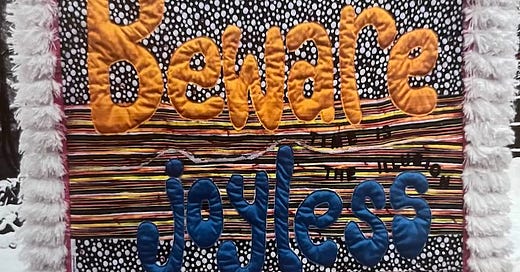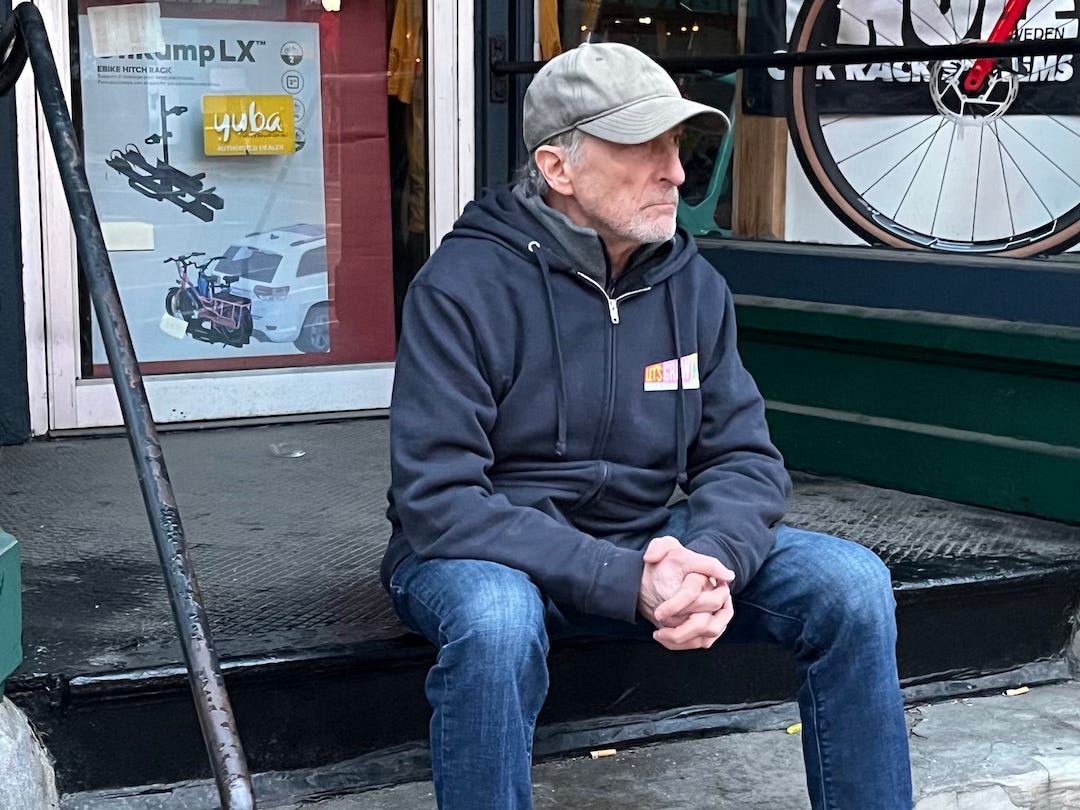#56: I Need a Break!
If you're gonna break the fourth wall you might as well smash it to smithereens. (i.e., Why this is the last "Street Cred"...for a while.)
I’ve now written more than fifty essays about my relationships with folks who live on the street by day and wherever they can at night. In a comment on a recent one,1 an old friend (like since 6th Grade) pointed out what she called “a vital tidbit…the passive-aggressive scene.” She saw what I knew subconsciously, but didn’t want to admit…
My veneer of radical acceptance has begun to crack.
From the beginning, people have told me I needed to establish clear limits and boundaries on these friendships. A badge or ID of some sort does that for people working in law enforcement, medicine, social services, or even academic research. They have rules and regulations that define what they can and cannot do.2
My whole approach has been predicated on not having those boundaries—to simply hang out with my friends. In the process, I’ve learned many things about homelessness, joblessness, the services that are available—and the urgent need for more. I’ve also witnessed a wide variety of mental health issues often including—but not limited to—multi-generational trauma and substance use. Things I thought I knew about but had never seen up close. I’ve also had many wonderful moments of connection and camaraderie…I often really look forward to hanging out, talking, and laughing with them. See, for example: There You Go Asking Questions Again.)
Simply drafting these pieces has proven to be an exhilarating walk on the writing wild side, as I’ve struggled to remain neutral—to leave it to the reader to juggle their own feelings of idealism, realism, compassion, “tough love,” & etc.
But, like I said, it’s time to admit my veneer of radical acceptance has begun to crack.
I’m always concerned that my stories will just reinforce stereotypes instead of humanizing the people involved. I really hope that my work dissolves those stereotypes. Because the one thing I can tell you for sure is that my friends are not “the homeless, “the panhandlers,” “the addicts,” or “those lazy bums.” They’re individuals with individual strengths, weaknesses, mental acuity, emotional resilience, employment situation (or lack there of) and personal/family history.
Let’s save the phrase compassion fatigue for people whose lives are dedicated 24/7 to helping the millions of people around the world (including in America) who are more desperately hungry and exposed to the elements than they are in Brattleboro, Vermont.
I now suffer more from what I’d call compassion bewilderment. There are so many ways to put compassion into action: Do I give money to social service organizations? “Round up” when I’m shopping? Go on a Buddhist Street Retreat or do some form of compassion meditation? Donate food, clothing, or camping supplies? Hand out gift cards for grocery stores and coffee shops? Give money, as I have been doing, often without knowing how it will be spent? Simply stop to talk with people about their lives? Or decide there are other social issues that are more important for me? The answers are different for everyone—and even from day to day—but I think they are always good questions to ask.
I also have to confess that I have been fascinated—in an almost prurient way—by the ongoing dramas of my friends’ lives, including the exaggerations or outright lies with which they might have been embroidering them. I should also acknowledge that I like being known as someone in touch with what’s “really” happening on the street—who’s who and what they may or may not be doing. When people in law enforcement, social services, or even familiar locals refer to someone, I usually know whom they’re talking about.
But the bottom line is that the cost of these relationships—financial, emotional, creative and time (especially time)—has, for now, become too high. I’ve lost the objectivity I’ve prided myself on. I’ve become, frankly, more pissed off than empathetic to my friends’ seemingly endless “emergencies.” Obviously, this is a reflection on me not them. They haven’t changed, I have.
It’s time to admit that I’ve started to be:
Exasperated by people telling me they can’t get a job or some benefit because, “I lost my ID…”
Shocked when I hear that you can buy a $10 gift card (from a grocery store or coffee shop) for $5 if the seller wants drugs more than food.
Dismayed by people telling me their clothes have been stolen, cell phones have been broken, or the money I just gave them has been ripped off…or at least telling me that, thinking, perhaps they can double down (or up). .
Annoyed by friends in recovery who’ve gone out of town without considering where they are going to get their next dose of methadone.
Disturbed by those who care more about getting cigarettes than food (even though I was addicted to that drug for many years.)
Horrified by people leaving their needles (or overdosing) in the bathrooms of restaurants and the Co-op, and others who just throw their needles where kids could pick one up.3
Most of all, I’ve been exhausted by the lies…the conniving, compulsive, manipulative, and pathological lies people have told me to get what they feel they desperately need.
BUT I’ve also become frustrated by my individual and society’s collective inability to do more.
Tired of hearing the shelter is full. And that there have been cutbacks to the state’s motel-room program.
Baffled when someone who has a housing voucher tells me they’re about to have their electricity turned off because they can’t pay the bill.
Sad that there are still too many people falling through inadvertent cracks in the “system."
Infuriated when I hear that there has been a “screw up” so someone hasn’t gotten their Medicaid coverage or housing subsidy or Snap [food stamp] card.
Mystified why on Saturday the town bus runs too late to get people to the methadone clinic on time. Especially since that’s the day people get “take home” doses for Sunday.
Impatient with people telling me that panhandlers are all lazy addicts who have “nothing to contribute to society” because all they do all day “is hustle money to do drugs.”
Wryly amused to read what a “success” it is that overdose deaths in our state have gone down 10%.
I could go on and on. In fact, maybe I have already for too long!
Is it “OK” to give cash to people on the street?
Well, in the last year or so, millions of people have given millions of dollars to a man who arguably has shown signs of being a pathological liar, sociopath, convicted felon, financial profligate, and abuser of woman. And he’s about to be sleeping in a large white house with servants…not a tent or shelter in Brattleboro.
I want to be really clear. This is not about politics. I respect all political beliefs. Even the ones I don’t share. But how dare anybody criticize the character of my friends on the street—or my choices about giving them money—when a person of this “character” has been given such power and privilege?
These essays began with a few simple posts about my friend Melvin—a guy who likes good pot, bad beer, and speaks the truth in more ways than one.
At the time, I was in the midst of writing a series about what writers do when they're not writing. For me, that includes hanging out with people on the street. Well, a few posts about Melvin turned into more than 50 essays about my lesser-known neighbors. Some are casual acquaintances to whom I’ve given a dollar or five once or twice. Others, I now know well. The series cost me more financially than I expected (I tried to write it off—psychologically if not IRS-worthy—as "paying" my sources.) But it has cost me a far more unexpected investment in time and emotion as I’ve shared their trials and tribulations.
And what now? If my New Year’s resolution is not to give more than $1 or $2 to anyone, does that mean I’m suddenly cutting off what I’ve been insistently calling my friendships? We’ll see.
A couple of days before the New Year, I went to the Co-op and came across a few of my friends hanging out on the other side of the parking lot. When they saw the look on my face, none of them asked me for money. Two bumped fists with me. One smiled shyly. And another thanked me and gave me a little hug—two things I thought she was incapable of doing.
I occasionally throw a “Leave a Comment” button in these posts. This time, in particular, I’d really appreciate hearing from readers whether these essays have given you a different perspective on “the epidemic of homelessness/addiction.” I’ve been told I’m being taking advantage of. I’ve been told I’m just enabling. I’ve been told I’m on some idealistic quest for unconditional love. All of which are undoubtedly true to some extent. I’m sure most people can understand why it’s time for me to take a break. But, I’m more curious about how/why/if these posts have changed your perspective.
What’s next?
I’ll probably continue to post Street Creds occasionally. My thoughts keep evolving and my friends’ lives keep changing. Believe me, if Melvin shows up back in town, you’ll be among the first to know.
But my focus will be, starting in February, to finally publish episodes of something entirely different: The Man who Woke up the Buddha—about a guy named Sid who, in the midst of a stroke realizes he’s the Buddha—even though he’s barely ever heard of the guy. Whether you’ve spent years practicing meditation, self-awareness, and/or other aspects of what’s called “spirituality;” or aren’t the least bit interested in the subject, I hope you’ll find the episodes more amusing, irreverent, and profound than you might expect. Like Street Cred, you won’t need to read them in order to follow the story. Here’s a sample chapter-in-progress.
Special note to paid subscribers:
I'm suspending all payments until April 1st. If you pay monthly, you won’t get billed again ’til then. If you pay annually, you’ll have the months added to your subscription.
It’s both my way of thanking you for your support and hoping that you’ll give The Man Who Woke up the Buddha a try.
It probably goes without saying: Happy New Year. It probably also goes without saying that some of my friends will be sleeping outside tonight.
Jim O’Connell whose work providing medical care to the homeless is described in the book Rough Sleepers was told by program administrators that he shouldn’t give cash to his friends (i.e., patients) on the streets of Boston. He still would slip a $10 to his “old-timers” from time to time.
Sometimes I just want to tell them that if they cleaned up their f-ing tent sites or the entryways where they sleep, the “housed” wouldn’t give them such a hard time.







Compassion must include the self, otherwise it is incomplete.
It is so important that more people understand the often cascading events that lead to their situation. You help me to remind me, to observe my response to ‘street people’ and see what I could/would/should offer in response.
Welcome to the world of working with vulnerable populations. I ran an AIDS Service Organization for 15 years and reading your pieces resonate in every way. In the end I accepted the fact that there was no right or wrong answer, and that my reaction was allowed to shift according to the day and circumstance. Following that experience I worked at a homeless shelter where my hardened exterior became even more hardened. There are so many realities to recognize that it makes your head spin. The conversation about compassion and understanding versus generational trauma, addiction, homelessness and mental health is endless. It's good to take a break.